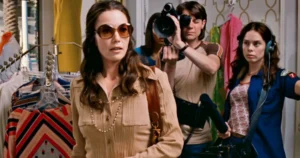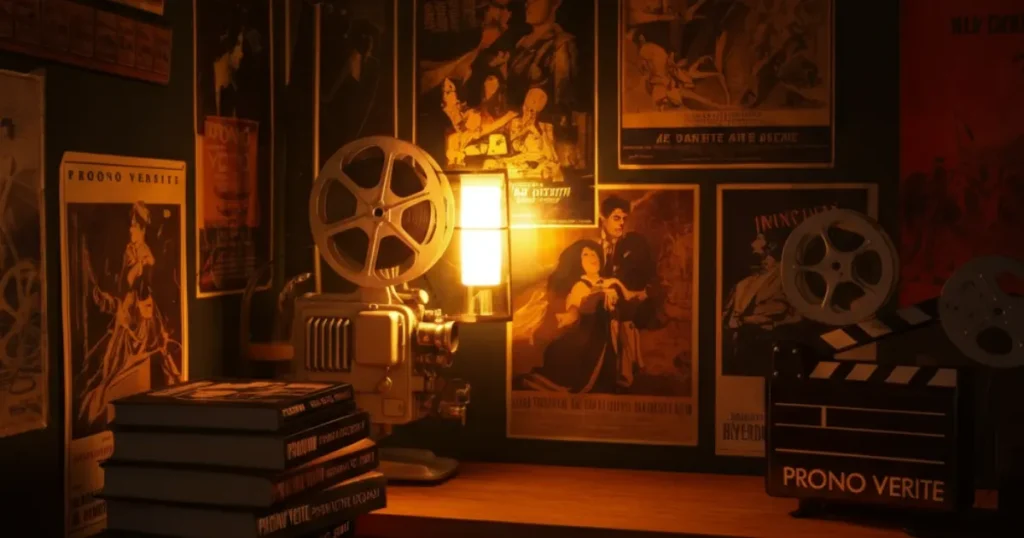Cinema has always evolved to reflect the lens through which we view the world. Among the most fascinating movements in filmmaking is Prono Verite, a style that combines raw realism with an unflinching portrayal of human experiences. The term “Prono Verite” is derived from the French words for “truth cinema,” and its mission is exactly that—to depict life as authentically as possible.
At its core, Prono Verite is not about polished productions or heavily stylized scripts. Instead, it strips away the glitz of traditional cinema, immersing audiences in the muddy, raw, and unfiltered narratives often ignored by mainstream films. This post will explore the origin, key characteristics, and cultural impact of this innovative filmmaking style.
The Origin and Evolution of Prono Verite
The Roots in Documentary Filmmaking
Prono Verite’s roots lie in the documentary tradition, particularly the Cinéma Vérité movement of the 1960s. Pioneered by French filmmakers like Jean Rouch and American pioneers such as Frederick Wiseman, Cinéma Vérité was characterized by naturalistic, unscripted storytelling. These films often featured handheld cameras, on-the-spot interactions, and minimal interference by directors, all aimed at presenting life in its most authentic form.
Building on this foundation, Prono Verite emerged in the late 20th century as a response to overly manufactured and dramatized mainstream productions. Inspired by Cinéma Vérité but with a bolder edge, it aimed not only to observe life but to fully immerse the viewer in it.
The Transition into Prono Verite
The late ’80s and early ’90s saw the birth of Prono Verite as filmmakers experimented with merging narrative and documentary techniques, focusing on themes that often made audiences uncomfortable. Social taboos, marginalized lives, and gritty realities served as the backbone of these films.
By the early 2000s, this genre started gaining traction globally. Independent filmmakers, armed with more accessible digital tools, embraced this style, creating compelling stories that transcended traditional cinematic norms.
Key Elements of Prono Verite
Prono Verite is defined by distinct characteristics that set it apart from mainstream cinema and even its predecessor, Cinéma Vérité.
Unscripted and Improvisational Dialogues
The actors in Prono Verite films often work without complete scripts. Directors encourage improvisation, lending authenticity to on-screen conversations. Scenes feel less like rehearsed performances and more like genuine slices of life.
Handheld Camerawork
One of the defining visual trademarks of Prono Verite is its handheld cinematography. The jerky movements and unsteady framing serve to pull viewers into the scene, making them feel like participants rather than mere observers.
Real Locations, Real People
Sets are rare in Prono Verite; real locations take center stage. From bustling urban streets to desolate rural homes, the backdrop becomes as much a character as the people within it. The genre also often employs non-professional actors to amplify authenticity.
Provocative Themes
Prono Verite thrives on exploring provocative, raw, and unspoken aspects of human life. Topics such as poverty, mental health, addiction, and systemic oppression are frequently depicted with a candor that is both unsettling and illuminating.
Minimal Post-Production
Unlike highly polished blockbusters, Prono Verite relies on minimal editing. Raw footage often takes precedence over a “clean finish,” maintaining the grit and spontaneity that defines the genre.
Notable Examples of Prono Verite

“The Penance” (1995)
A landmark film often credited as the first official Prono Verite work, The Penance follows the story of a factory worker grappling with depression and systemic injustice. Directed by Sophia LaRoche, the film uses unsettlingly close handheld shots and improvised dialogue to immerse viewers fully in the protagonist’s struggles.
“A Quiet Room” (2003)
This Finnish film broke barriers by hiring real patients from a psychiatric clinic as the cast. A Quiet Room explores themes of trauma and healing, offering a hauntingly honest portrayal of mental illness.
“Dark Corners, Bright Dreams” (2010)
Shot entirely on an $8,000 budget, this New York-based film chronicles the intersecting lives of struggling immigrants. The film was lauded for its unfiltered look at identity, oppression, and resilience.
“The Edge of Us” (2018)
This Canadian film follows a teenage girl left to fend for herself in a small, deteriorating mill town. The film’s use of real residents as actors and improvised dialogue makes it a quintessential Prono Verite masterpiece.
How Has Prono Verite Been Received?
The reception of Prono Verite has been divisive. On one hand, critics hail it for exposing societal truths and giving voices to marginalized communities. Films in this genre often receive praise for their unflinching honesty, with audiences describing them as “raw,” “visceral,” and “painstakingly authentic.”
On the other hand, detractors of the style argue that its provocative themes and unpolished execution sometimes make it inaccessible to wider audiences. Some viewers feel alienated by the stark realism and lack of escapism that the genre offers.
Nonetheless, Prono Verite has cemented its place in the cinematic landscape, influencing mainstream filmmakers to adopt elements of realism in their works while inspiring an entire generation of indie creators. Its cultural footprint is undeniable, as more audiences seek films that mirror life’s complexities without glossing over the hard parts.
Why Prono Verite Matters
Amid a sea of Hollywood extravagance and CGI-heavy spectacles, Prono Verite stands as a reminder of cinema’s roots in storytelling and human connection. By shedding the embellishments of traditional filmmaking, it dares to place the truth, however raw or uncomfortable, at the forefront.
Prono Verite continues to push the limits of what cinema can achieve and how it can reflect the world we live in. For anyone seeking authenticity in storytelling, it’s a genre that holds a mirror up to humanity and forces us to confront our own realities.
If you’ve yet to explore Prono Verite films, consider starting with the titles listed above. You may find yourself not just entertained, but deeply moved and inspired by their honest depiction of life.





